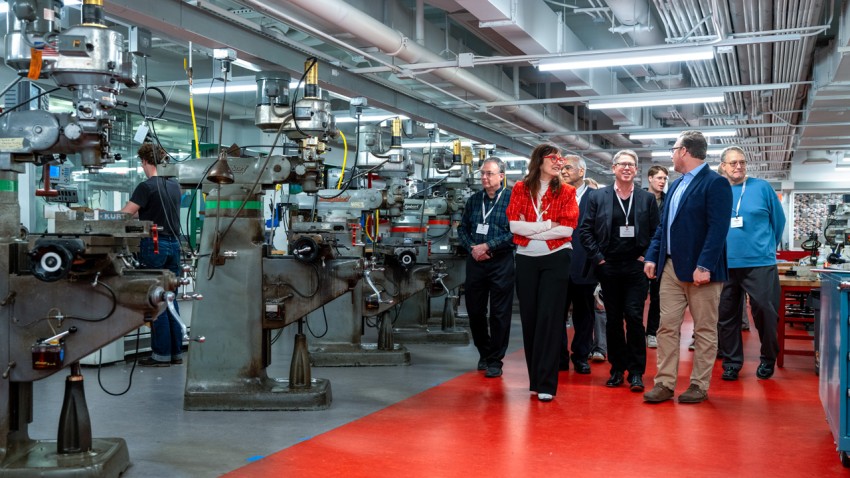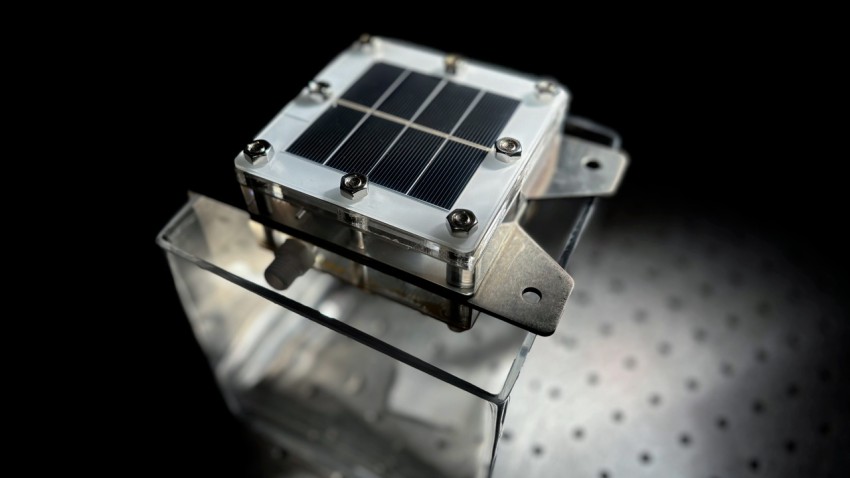Imagine. Design. Create.
Real innovation comes from the marriage of deep technical knowledge with creative imagination. Our programs nurture both the mind and the imagination. We accelerate discovery to make impactful and lasting changes, and we foster engineering leaders and entrepreneurs who will go on to solve the world’s biggest problems.
News Highlights
-
![A tour of Upson Hall’s Autodesk Design and Make Space]()
$4.3M gift from Autodesk names two makerspaces
The software company is contributing $2 million each to Cornell’s College of Architecture, Art and Planning and Cornell Engineering to name and update “design and make” spaces.
-
![A Cornell-led team built a 10 centimeter by 10 centimeter prototype device that produces carbon-free “green” hydrogen via solar-powered electrolysis of seawater, with an important byproduct: potable water.]()
Sunlight and seawater lead to low-cost green hydrogen, clean water
Researchers developed a low-cost method to produce carbon-free “green” hydrogen via solar-powered electrolysis of seawater, with a helpful byproduct: potable water.
-
![]()
Sibley School hosts industry forum on AI design education
Cornell’s Sibley School of Mechanical and Aerospace Engineering brought together faculty, students, alumni and industry leaders for a day-long forum titled “Simulation and Design Education: Closing the Skills Gaps in the Age of AI,” hosted April 17 as the annual KK Wang Industry Day.
-
![Lynden Archer, right, the Joseph Silbert Dean of Engineering, presents James C. Morgan ’60, MBA ’63 with the Cornell Engineering Distinguished Alumni Award.]()
James Morgan ’60, MBA ’63, earns Engineering’s highest alumni honor
In recognition of his transformative leadership in nanomanufacturing technology, James C. Morgan ’60, MBA ’63, was presented with the Cornell Engineering Distinguished Alumni Award – the college’s highest alumni honor.
Our Degree Programs
-
Mechanical Engineering
Involves the design and analysis of machines, engines, and systems. Perfect for those fascinated by motion, energy, and innovative mechanical solutions.
-
Aerospace Engineering
Involves designing and testing aircraft and spacecraft. It’s ideal for those excited by flight, space exploration, and advancing technologies in propulsion and aerodynamics.
-
Applied Mathematics
Uses math to solve real-world problems in science and engineering. Ideal for those who enjoy mathematical modeling and want to apply theory to practical issues.
-
Theoretical and Applied Mechanics
Explores the principles of motion and forces in engineering systems. Great for those who want to innovate in fields like aerospace, robotics, or structural design.
Strategic Research Areas
-
![yellow material stretching between a base and an instrument.]()
Advanced Manufacturing and Materials
Material design through understanding how nano, micro, and/or mesoscale mechanisms result in macroscale properties.
-
![Two students in white lab coats and protective goggles examine a piece of equipment in the Hernandez lab]()
Biomechanics and Mechanobiology
Investigating the role of mechanical forces in physiological and disease processes.
-
![person holding a smartphone with a blood-testing device attached]()
Bioengineering and Healthcare
Technology research translated to biomedical applications, such as early cancer detection, immunology treatments, and global and mobile health.
-
![wind turbines against a sunset sky]()
Energy and Sustainability
Developing new energy sources and technologies that benefit the environment and economy, and helping to implement those technologies.
-
![three black spiral robotic parts held in a hand]()
Robotics and Autonomy
Robotics at Cornell spans various subareas, including perception, control, learning, planning, and human-robot interaction.
-
![close-up of a hand holding a yellow and black chipsat.]()
Space Science and Engineering
Satellite systems design, space “weather”, solar geo-engineering, space-system design, cubesats, optical and radar satellites for remote sensing, and methods and tools for the detection of extrasolar planets.









